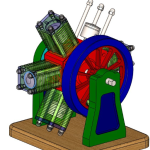Course Overview:
This course focuses on the concept of computational mechanics through the use of the Finite Element Method (FEM) as a key tool for analyzing and designing industrial projects. The aim is to equip participants with the knowledge and skills necessary to apply FEM to solve complex engineering problems, enhancing their ability to analyze the dynamic and engineering behavior of materials and structures.
Course Objectives:
- Understand the fundamental principles of computational mechanics and the Finite Element Method.
- Learn how to use FEM software for mechanical system analysis.
- Develop skills in designing and analyzing structures and materials using FEM.
- Apply acquired techniques to real industrial projects.
- Improve the ability to critically evaluate and analyze results.
Training Content:
- Introduction to Computational Mechanics: Fundamentals and basic concepts.
- Finite Element Method (FEM): Principles and applications.
- FEM Software: Using common tools such as ANSYS and ABAQUS.
- Model Preparation: How to create and analyze FEM models.
- Stress and Deformation Analysis: Understanding how to analyze the structural behavior of materials.
- Thermal and Dynamic Analysis: Studying the effects of heat and motion on structures.
- Interpreting Results: How to read and interpret results generated from analyses.
- Case Studies: Practical applications on various industrial projects.
Target Audience:
This course is designed for mechanical engineers, structural engineers, design engineers, maintenance engineers, and researchers in engineering and applied sciences who wish to enhance their skills in using FEM for the analysis and design of industrial projects. It is also suitable for technicians and analysts working in the manufacturing, construction, and energy sectors.






